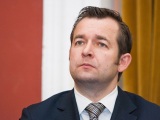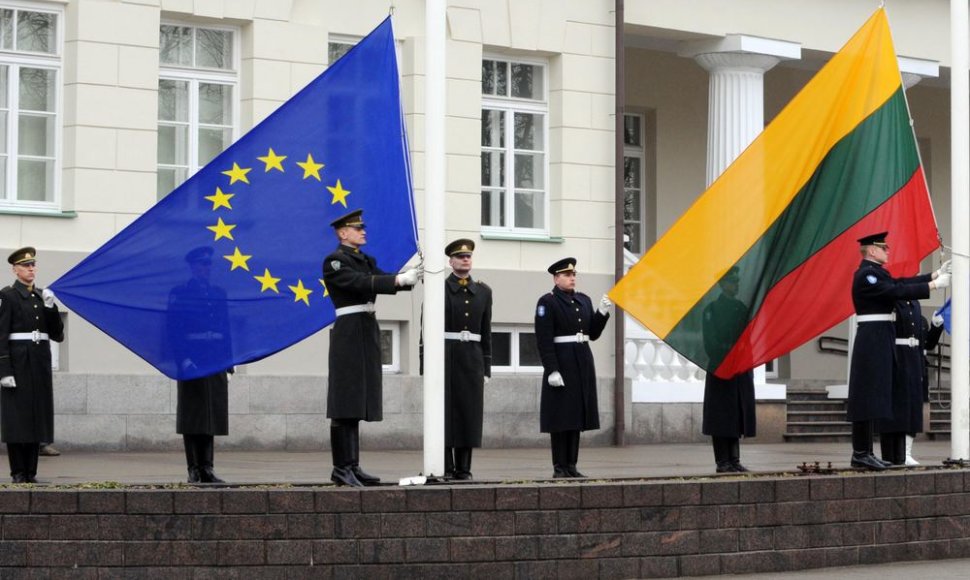Lithuania is taking over the helm of the EU on Monday and will be in charge of operations of the EU Council, which brings together officials of all member-states. The Baltic nation will also represent the institution in negotiations with the European Commission and the European Parliament, as well as present the EU position in relations with third countries and international organizations.
"It is the start of a historic six months for our country. We have a unique opportunity to tell Europe what Lithuania can be proud of – capacities of our people, beauty and achievements of our country," President Dalia Grybauskaitė said.
 |
| prof. Ramūnas Vilpišauskas |
Although the majority of decisions will be made in negotiations in Brussels, Vilnius will also get more attention – during the six months of the presidency, Lithuania will host more than 200 meetings including over a dozen on the ministerial level. About 30,000 guests are expected in Lithuania.
"The countries that have the presidency responsibility for the first time see it as some type of a transition from the status of an EU newcomer to an old member," Ramūnas Vilpišauskas, director of Vilnius University's International Relations and Political Science Institute, told BNS.
Geopolitical struggle for the East
The EU Eastern Partnership program, which seeks closer economic and political relations with six post-Soviet countries, will be one of the Lithuanian presidency priorities. In November, their leaders along with EU top officials will be invited to a Vilnius summit for expected signing of an association and free trade agreement with Ukraine and announced completion of negotiations on the agreements with Armenia, Moldova, and Georgia. No major progress is expected in connection to Belarus and Azerbaijan.
 |
| Vytis Jurkonis |
"Lithuania's focus during the presidency will be placed on Ukraine, and the biggest hopes in the region are pinned to the country. However, knowing the political situation in Ukraine, it is obvious that nobody can give any guarantees – a lot depends on the official Kiev and its position on the Association Agreement," political scientist Vytis Jurkonis told BNS.
Eastern Partnership has caused Russia's concern, as the country has been long urging Ukraine to join the Customs Union it has been building. Moscow wants the Customs Union to evolve into a well-integrated Eurasian Union.
Lithuanian and EU officials, in their turn, warn that Ukraine cannot be member of both blocs at the same time, saying it could not expect a free trade agreement with the EU after joining the Customs Union.
"In the run-up to the Eastern Partnership summit in Vilnius, we are somewhat concerned over the calls to dictate conditions to target countries of Eastern Partnership to pick one integration union or another," Russian Ambassador to Vilnius Vladimir Chkhikvadze has told Vilniaus Diena daily.
Laurynas Kasčiūnas, an expert at the Eastern Europe Study Center in Vilnius, says that the post-Soviet region is locked in a geopolitical struggle.
 |
| Laurynas Kasčiūnas |
"Seeing now Russia aims to lure Ukraine into the Eurasian Union, we can definitely say that there is a geopolitical struggle. Of course, nobody will say it openly, but it is indeed a geopolitical struggle, especially for Lithuania and Poland – it is the matter of two integration areas, which will be more attractive to the countries between them. It is of crucial importance," Kasčiūnas told BNS.
Some EU countries demand that, prior to signing of the agreement, Ukraine release its ex-PM Yulia Tymoshenko from prison. The Western world deems her imprisonment a politically-motivated prosecution, also defined as "selective justice."
Chairman of the Lithuanian parliament's European Affairs Committee Gediminas Kirkilas says that the September general elections in Germany will shed light on the situation in connection to the Ukrainian agreement.
"Decisions will probably be made after the German elections, as there are a few countries that are still against and demand that Ukraine refrain from the so-called selective justice," Kirkilas, a former prime minister and a member of the ruling Lithuanian Social Democratic Party, told BNS.
He said the probability of signing the document in Vilnius was 70 percent.
Challenge in financial negotiations
During its EU Council presidency, Lithuania will focus on the negotiations on the 2014-2020 EU budget of nearly one trillion euros. Although EU institutions reached a political agreement on the budget last week, the EP vote will take place during the Lithuanian presidency. Lithuania will have to coordinate talks on more than 70 legal acts regulating individual budget programs.
 |
| Petras Auštrevičius |
"Lithuania needs to prepare for very serious, lengthy and difficult negotiations, as the 70 regulations on the 2014-2020 financial perspective will be a challenge for us," Liberal MP Petras Auštrevičius told BNS.
Creation of the EU banking union will be yet another important issue. During the Lithuanian presidency in July-December, EU institutions and member-states will continue harmonizing rules of restructuring troubled banks without spending tax-payer money but using the bank money, as well as ways of ensuring shared bank supervision.
Nevertheless, banking union and some other economic and financial issues are primarily negotiated in the eurozone. This will diminish the Lithuanian role.
"Countries that are not members of the zone do not participate in the discussion of issues important for the eurozone, even if such countries hold EU Council presidency. This was the case with Poland a few years ago and later Denmark – it also did not attend the discussions for countries of the eurozone," said Vilpišauskas.
"As more and more instruments are being discussed among members of the eurozone only, non-membership in the eurozone will also restrict the potential of Lithuania as the presidency to influence the agenda of the discussions," the political expert said.
Lithuania's government expects to adopt the euro in 2015.


















